Inmate, Veteran Recovery Program Provides Pathways To Change
March 18, 2018
Serving in Afghanistan left 29-year-old Army veteran Derick Zemke with a knee injury that would impact his life more than he could imagine.
Somewhere between surgeries and the pain that came with his injury, Zemke’s use of prescription pain medicine turned to abuse, escalating to dealing opioids and eventually using street drugs to sustain his habit.
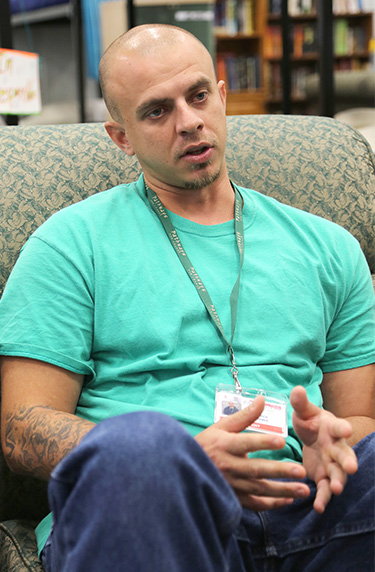 But after three and a half years in and out of jail, Zemke (pictured left) was ready to turn his life around. A fellow inmate told him about the Pathways for Change addictions treatment program, and he decided to go for it. Escambia County provides financial support to the program, which is housed at the Escambia County Work Release Center on West Fairfield Drive.
But after three and a half years in and out of jail, Zemke (pictured left) was ready to turn his life around. A fellow inmate told him about the Pathways for Change addictions treatment program, and he decided to go for it. Escambia County provides financial support to the program, which is housed at the Escambia County Work Release Center on West Fairfield Drive.
“I was a productive member of society before,” Zemke said. “I played high school football, baseball, basketball, made great grades, was in the Army. And I wanted to get back to what I used to be before the pain medicine.”
The Men’s Residential Treatment at Pathways for Change is an alternative sentencing option for non-violent criminal offenders who want to overcome destructive behaviors, attitudes and habits that prevent them from living a life free from crime and incarceration.
This year, Escambia County provided $175,000 to Pathways for Change, and an additional $168,750 was allocated to the county’s probation fund to house program participants. Historically, the county has provided $140,000 directly to Pathways for Change each year in addition to the $168,750 for housing.
Zemke started Pathways for Change in July 2017 and is set to graduate in January 2019, with plans to go to college in May to study hospitality and eventually work in the tourism industry.
Along with his physical injuries, Zemke has battled post-traumatic stress disorder since his time in Afghanistan, and his automatic response was to self-medicate and keep his feelings inside. But in Pathways for Change, he gave counseling a try, started working through a PTSD workbook and opened up about his struggles.
Zemke said his hope is that after he graduates, he can help other veterans who are facing challenges similar to his own.
“It’s hard to go talk to a doctor that’s never experienced the things that you’ve experienced and be open with them about it,” Zemke said. “But talking to another veteran, I feel that I can talk to somebody and I’ve been in the same exact place as them – using opioids, battling PTSD, feeling like an outcast or a black sheep. And if I can relate on that level with them, they’re more likely to open up and try to change…so that inspires me to keep doing this, and hopefully I can save more lives than just my own.”
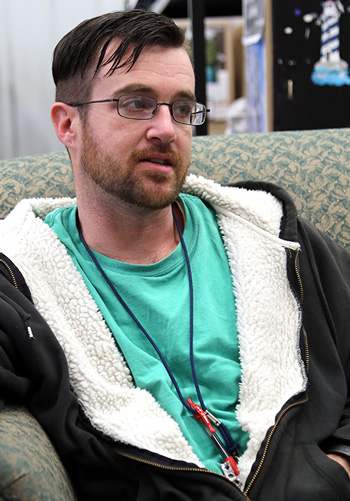 Army veteran Allen Townsend, 29, agreed that being able to openly talk with others is a significant benefit to being in the program. Townsend began drinking heavily after his first deployment to Iraq, eventually moving on to meth and dealing drugs.
Army veteran Allen Townsend, 29, agreed that being able to openly talk with others is a significant benefit to being in the program. Townsend began drinking heavily after his first deployment to Iraq, eventually moving on to meth and dealing drugs.
After a two-month crime spree with his wife that left him charged with 28 felonies, he was ready to serve his 10-year minimum rather than enter Pathways for Change. His wife and oldest daughter convinced him otherwise, and he decided to give the program a chance.
“Without this program, I would definitely be out using again,” Townsend (pictured left) said. “I have learned to trust other people, other men, which is something I haven’t done since the Army. It’s a great support group – guys I can talk to, and they’re honest to me.”
Townsend will graduate in October of this year, with plans to complete an IT training program and move to Colorado to start fresh. With his wife still battling a drug addiction, Townsend is estranged from his family. He said Pathways for Change has become his family.
“These guys want me to succeed as much as I want them to succeed,” Townsend said. “I could have known these guys my whole life from what we’ve been through together.”
Navy veteran McArthur Franklin, 44, is nearing the end of his time in Pathways for Change, with his graduation set for April. After an injury forced him to leave the military, he fell into drug and alcohol addiction and suffered from PTSD.
Franklin said the program is not for the faint of heart, but the challenge is worth it.
The four-phase, 18-month program includes basic living and communication courses, group therapy, individual therapy and community service, with the final phase of the program allowing participants to live outside of the center and report back for periodic drug screenings.
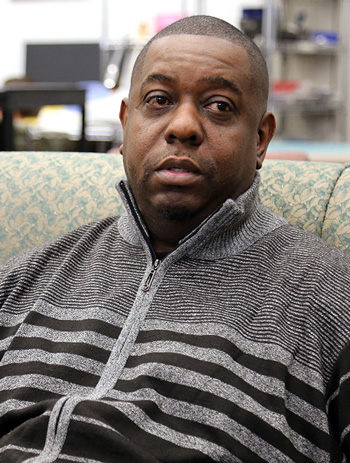 “There’s a lot of rules here that you’ve got to follow, and if you don’t really want to be here, you’re not going to do it,” Franklin (pictured left) said.
“There’s a lot of rules here that you’ve got to follow, and if you don’t really want to be here, you’re not going to do it,” Franklin (pictured left) said.
Pathways for Change also connected Franklin with veteran-specific services like Volunteers of America, which helped him get an apartment of his own. Franklin is enrolled in barber school at Pensacola State College and plans open his own barber shop after he graduates.
“They’re teaching us that it’s a better way of life to focus on goals and actually try to complete them,” he said. “They’re pretty much dedicated to helping us, the people here actually are genuine and they show that they care.”
Lt. Anita Hemphill, the first lieutenant over security at the Escambia County Work Release Center, said the county supports programs like Pathways for Change that offer alternatives to incarceration.
“Pathways for Change is a solidified program that helps with recidivism,” Hemphill said. “It’s a very disciplined program – I think it has to be disciplined for someone to be put to the test and see if they’re really ready to make that lifestyle change and become productive citizens in the community.”
Escambia County Corrections Director Tammy Jarvis also emphasized the importance of alternatives to incarceration, which she said are an excellent way to assist nonviolent offenders in dealing with mental health, anger management and addiction issues.
“Incarceration alternatives help offenders transition from the lifestyle that got them into jail to having stable employment, becoming self-sufficient and maintaining a crime-free life,” Jarvis said.
Each crime avoided also benefits the community in reduced victimization and reduced costs, Jarvis said, since criminal justice costs are driven by volume of activity.
“Reducing recidivism can help reduce overall volume of activity, which in turn results in long-term savings,” Jarvis said. “Programs such as this provide a long-term investment in our community by providing those served with the support they need to restructure their lives and achieve success.”
Photos for NorthEscambia.com, click to enlarge.
Comments
8 Responses to “Inmate, Veteran Recovery Program Provides Pathways To Change”



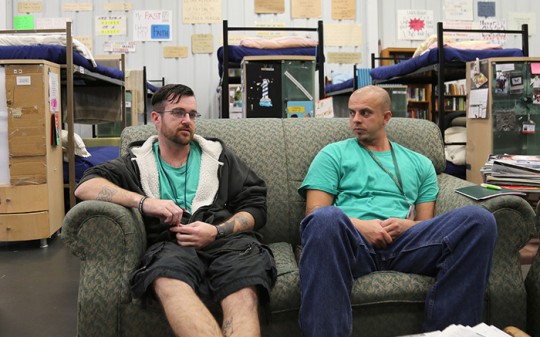
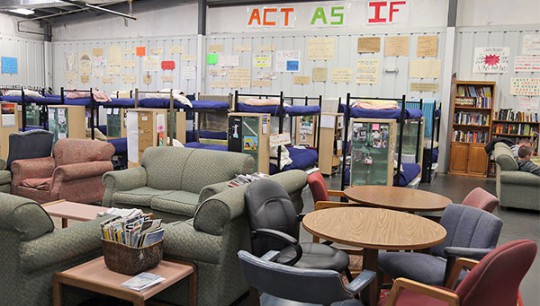
@ Tabby I don’t know what kind of women you know but I know a few military ex wife’s who work very hard to provide for their children. And take care of them while the deadbeats get all the special treatment and just like you and others still judge them if they ask for help. I choose to help the spouse that leaves and teaches their children to be safe and not sorry. It’s such a loss to go back and forth about a subject no one cares about.
Your darned right I’ll put the blame wherever it may belong. The father for allowing himself to be weak minded, getting hooked on drugs yes. More so for that mother, being a part time mom, wanting the best for the children when it comes from someone else, but still going out juking several times a week, pushing her child in front of a video game (teaching him to be violent) or a TV (teaching him to be a liberal communist). So yeah, chump change for a few guys who have a proven record of doing for others who got weak for drugs, or an incalculable amount of children that the parent should’ve went to college for.
Wow the judgment of children never end. So while these men are off getting help and all the glory the women struggle to do whatever is necessary to provide for the children in shame. Maybe the men should have thought about the children before they destroyed their life and the mom’s. But hey let’s help the grown men and later put the blame on the mom’s.
I agree with you 100% Tabby! Our family couldn’t afford braces for our teeth so guess what? None of us got braces & we all turned out just fine! Braces are NOT a requirement to living a productive life. Yes, I wish I had beautiful, straight teeth but it hasn’t stopped me from being a productive member of society! My motto is ‘If you can’t feed ‘em, Don’t breed ‘em’!! SO many people now expect society to PAY for everything for them & their offspring! Get a job! Don’t have kids if you can’t afford things that you would like them to have. Pretty simple concept really…
Braces are NOT a requirement to living a productive life. Yes, I wish I had beautiful, straight teeth but it hasn’t stopped me from being a productive member of society! My motto is ‘If you can’t feed ‘em, Don’t breed ‘em’!! SO many people now expect society to PAY for everything for them & their offspring! Get a job! Don’t have kids if you can’t afford things that you would like them to have. Pretty simple concept really…
sorry, but it all sounds like a way to get a free ride thru school to me. plenty of men have served in wartime without becoming criminals or substance abusers, or asking for special treatment when they got home.
And yet there are only a handful of inmates compared to countless children who need dental work. Inmates once lauded as heroes sacrificing their lives and welfare of their families lives for the freedom of people they didn’t even know (most of whom still don’t appreciate). Yes, they made a choice due to whatever mental or PTSD issues to take drugs. However I feel much more sympathy for them than some mediocre person who by their own choices, can’t afford dental insurance for a kid most likely on a horrible diet full of soda anyway. You must be one who wants the benefits of the service, not the sacrifice.
And yet there are children who can not afford braces for their teeth and the parent are looked down on for even trying to ask for help. Even adults can’t afford dental. If they ask for help they are judged seems that being a drug addict has more advantages than not. They have so many people wanting to help them.
I heard someone say on the subject a few days ago on here to let the preachers pay for this program not their tax dollars. And that is the mentality of what must be a perfect human being. That’s the mentality of this county, they could’ve volunteered their whole life or won the congressional medal of honor, made a mistake, hang em. Unless of course it’s a family member or friend of someone in the “clique”.